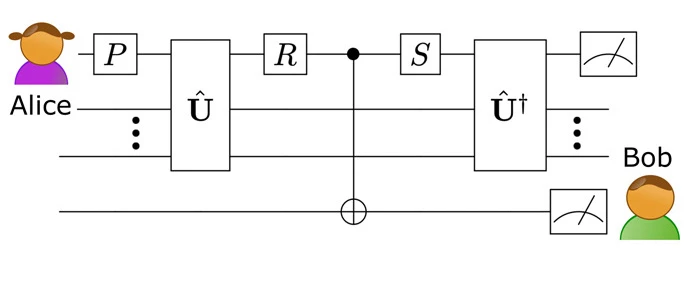Time travel movies have different rules about what happens when you start messing around with the timeline. If you’ve ever wondered which ones make the most sense, we may now have an answer. According to experiments using a quantum time travel simulator, reality is more or less “self-healing,” so changes made to the past won’t drastically alter the future you came from – at least, in the quantum realm.
The classic Back to the Future rules of time travel say that whatever you change in the past can have huge effects on the future. That’s why Marty McFly can almost erase his own existence by accidentally stopping his parents from meeting, and why Biff Tannen can get rich by giving his younger self a book of sports scores to bet on.
Other movies handle things differently. In Avengers: Endgame, the superheroes travel back in time to steal versions of the Infinity Stones out of different time periods to revive their fallen friends (look, it doesn’t make much sense unless you’ve seen all 20-something movies). Anyway, they can dabble in the past without ruining the future because the universe has a knack for correcting those paradoxes so that both versions of events did happen.
But which set of rules has more basis in science? According to a new study, quantum mechanics supports the Avengers model.
In a way, it all comes down to the butterfly effect, where a tiny action in one system can escalate into huge consequences. The name comes from the principle of chaos theory that a butterfly flapping its wings could set off a cascade of events that causes a hurricane in another part of the world.
In terms of time travel though, the term might have originated in reference to Ray Bradbury’s 1952 sci-fi story, A Sound of Thunder. In this story, time tourism is readily available, but carefully controlled so as not to affect the present. While on one of these trips into the distant past, a character steps off the beaten track and accidentally kills a butterfly, and when he returns to his own time, things have dramatically changed.
So how can we test these ideas? Since we can’t exactly jump into a TARDIS and start experimenting ourselves, researchers at Los Alamos National Laboratory used a quantum computer to develop a simulation of time travel. And their results were somewhat surprising.
“On a quantum computer, there is no problem simulating opposite-in-time evolution, or simulating running a process backwards into the past,” says Nikolai Sinitsyn, co-author of the study. “So we can actually see what happens with a complex quantum world if we travel back in time, add small damage, and return. We found that our world survives, which means there’s no butterfly effect in quantum mechanics.”
Using an IBM-Q quantum processor, the team created a complex system using quantum gates and demonstrating cause and effect, running both forwards and backwards in time. The simulation involved two hypothetical people, Alice and Bob, who each have a qubit – a quantum bit of information.
In the scenario, Alice prepares her qubit in the present, then sends it backwards in time. At some point in the past, Bob interferes with the qubit by measuring it. Then, the system is run forwards again to the present time, and Alice checks her qubit.
What you think “should” happen next depends on which time travel rules you subscribe to. The butterfly effect says that because the qubit is tied to so many variables, Bob’s small interference should completely change the system by the time we get back to the future (or present, to Alice).

But the team found that that wasn’t the case. Alice’s qubit comes back relatively unscathed, and she can recover the information on it. Interestingly, the fact that it’s tied to so many variables seems to be what actually saves it from damage – the information in the present qubit was hidden in the quantum correlations in the deep past. This web of connections isn’t so easily disturbed by Bob’s amateur efforts at timeline vandalism.
Stranger still, the further back in time the qubit travels, and the more complicated the whole system is, the less damage the qubit takes from interference. That might seem counterintuitive – since there are more things for the butterfly’s wings to knock over, so logically the effects should be more dramatic. But by the team’s reasoning, this just creates a stronger web of quantum correlations to protect the qubit from damage.
“We found that the notion of chaos in classical physics and in quantum mechanics must be understood differently,” says Sinitsyn.
If we want to take these findings to their logical conclusion, the argument could be made that Back to the Future represents time travel through classical physics, while Avengers: Endgame is a model of quantum time travel. Intriguingly, the latter movie justifies time travel by having the characters manipulate the “quantum realm.”
While the study may mostly seem like just a fun thought experiment, the team says that the simulation could have some real-world benefits. For one, since there’s no way a classical processor can handle this kind of simulation, it could be used as a way of testing whether a quantum computer is actually working on quantum principles.
The team also says that the concept could be used to create new security protocols for information in quantum systems. If a more sinister real-world Bob tries to mess with the qubits, the system can convert the information into a strongly entangled state to protect it.
“We found that even if an intruder performs state-damaging measurements on the strongly entangled state, we still can easily recover the useful information because this damage is not magnified by a decoding process,” says Bin Yan, co-author of the study. “This justifies talks about creating quantum hardware that will be used to hide information.”
The research was published in the journal Physical Review Letters.
Source: Los Alamos National Laboratory




